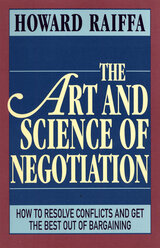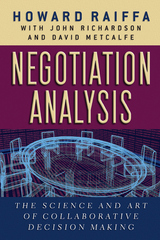
Whether you are selling a house, closing a business deal, settling a divorce, arbitrating a labor dispute, or trying to hammer out an international treaty, Howard Raiffa’s new book will measurably improve your negotiating skills.
Although it is a sophisticated self-help book—directed to the lawyer, labor arbitrator, business executive, college dean, diplomat—it is not cynical or Machiavellian: Raiffa emphasizes problems and situations where, with the kinds of skills he aims to develop, disputants can achieve results that are beneficial to all parties concerned. Indeed, he argues that the popular “zero-sum” way of thinking, according to which one side must lose if the other wins, often makes both sides worse off than they would be when bargaining for joint mutual gains.
Using a vast array of specific cases and clear, helpful diagrams, Raiffa not only elucidates the step-by-step processes of negotiation but also translates this deeper understanding into practical guidelines for negotiators and “intervenors.” He examines the mechanics of negotiation in imaginative fashion, drawing on his extensive background in game theory and decision analysis, on his quarter-century of teaching nonspecialists in schools of business and public policy, on his personal experiences as director of an international institute dealing with East/West problems, and on the results of simulated negotiation exercises with hundreds of participants.
There are popular books on the art of winning and scholarly books on the science of negotiation, but this is the first book to bridge the two currents. Shrewd, accessible, and engagingly written, it shows how a little analysis sprinkled with a touch of art can work to the advantage of any negotiator.

This masterly book substantially extends Howard Raiffa's earlier classic, The Art and Science of Negotiation. It does so by incorporating three additional supporting strands of inquiry: individual decision analysis, judgmental decision making, and game theory. Each strand is introduced and used in analyzing negotiations.
The book starts by considering how analytically minded parties can generate joint gains and distribute them equitably by negotiating with full, open, truthful exchanges. The book then examines models that disengage step by step from that ideal. It also shows how a neutral outsider (intervenor) can help all negotiators by providing joint, neutral analysis of their problem.
Although analytical in its approach--building from simple hypothetical examples--the book can be understood by those with only a high school background in mathematics. It therefore will have a broad relevance for both the theory and practice of negotiation analysis as it is applied to disputes that range from those between family members, business partners, and business competitors to those involving labor and management, environmentalists and developers, and nations.
READERS
Browse our collection.
PUBLISHERS
See BiblioVault's publisher services.
STUDENT SERVICES
Files for college accessibility offices.
UChicago Accessibility Resources
home | accessibility | search | about | contact us
BiblioVault ® 2001 - 2024
The University of Chicago Press









